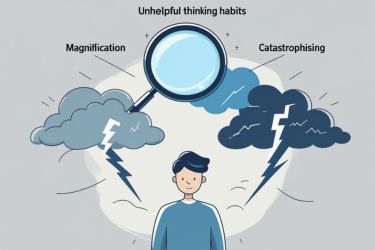Unhelpful thinking habits can often lead us to see the world in a distorted way, affecting our emotions and actions. One common form of these habits is overgeneralising, where we take one negative experience and apply it broadly to other situations. Recognising and addressing overgeneralising is crucial for improving our mental well-being and making better decisions.

We might find ourselves thinking something like, "I failed this test, so I must be bad at everything." This thought pattern can create unnecessary stress and limit our potential. By identifying these unhelpful habits, we can start to change our mindset and outlook on life, leading to healthier thoughts and behaviours.
In this article, we’ll explore how overgeneralising manifests in our daily lives, its psychological effects, and practical strategies we can use to overcome it. We aim to help each other break free from these patterns and lead more fulfilling lives.
Key Takeaways
- Overgeneralising distorts our perception by applying one experience to all similar situations.
- It can lead to increased anxiety and lower self-esteem.
- Recognising and addressing these patterns is essential for positive mental health.
Understanding Overgeneralising as a Cognitive Distortion

Overgeneralising is a common cognitive distortion that impacts how we perceive situations and form judgments. It can lead to unnecessary stress and negative thoughts. In this section, we will define overgeneralising, explore its origins in the cognitive model, and distinguish it from similar thinking styles.
Definition and Explanation
Overgeneralising occurs when we take one instance or experience and apply it broadly to other situations. For example, if we fail at one task, we might think, “I always fail.” This type of thinking leads us to see a single negative event as part of a never-ending pattern.
It is essential to understand that overgeneralisation can distort reality. We may overlook successes or positive experiences, focusing only on failures. This pattern can contribute to feelings of hopelessness and low self-esteem.
Origins in Cognitive Model
The concept of overgeneralisation stems from cognitive psychology, particularly the work of Aaron Beck. Beck identified cognitive distortions as unhealthy thinking patterns that affect our emotions and behaviours. Overgeneralisation is one of the core unhelpful thinking styles that leads to negative outcomes.
Cognitive distortions like overgeneralising often arise from underlying beliefs. We might hold an irrational belief about ourselves that leads us to make sweeping conclusions based on limited evidence. Recognising these thoughts is the first step in challenging and changing them.
Distinguishing Overgeneralising From Similar Thinking Styles
Overgeneralising is often confused with other cognitive distortions, such as black-and-white thinking or catastrophising. Black-and-white thinking involves seeing situations in extremes, without any middle ground. For instance, if we do not get a promotion, we might immediately think, “I am a failure.”
Catastrophising, on the other hand, involves imagining the worst possible outcome. While all these thinking styles distort reality, overgeneralisation specifically focuses on applying one experience to many. By understanding these differences, we can better identify unhelpful patterns and work towards more balanced thinking.
Manifestations and Examples of Overgeneralising

Overgeneralising manifests in various ways and can greatly impact our thoughts and behaviours. We often see this behaviour through certain patterns and automatic thoughts. It can shape how we communicate with ourselves, as well as how we perceive our experiences in daily life.
Common Patterns and Automatic Thoughts
We frequently encounter specific patterns when overgeneralising. For example, we might label ourselves based on a single event, such as thinking, “I failed this test, so I’m a failure.” This negative automatic thought reflects a distorted view that extends one instance to our entire identity.
Another common pattern is all-or-nothing thinking. Here, we see situations in black-and-white terms. If we don’t achieve perfection, we might think we have completely failed. This leaves no room for nuance or progress.
Jumping to conclusions is also a hallmark of overgeneralising. We might assume the worst about an outcome based on a small piece of information. For instance, if a colleague doesn’t respond to an email, we may conclude they dislike us, despite no evidence to support that thought.
Language and Thinking Clues
The language we use can provide insights into our thinking habits. Phrases like "always" and "never" signal overgeneralisation. For example, saying, “I always mess up” indicates an all-or-nothing approach.
We might also find ourselves labelling experiences in an overly simplistic way. Terms like “I’m terrible at this” ignore our ability to improve or learn.
Mental filtering plays a significant role, too. We tend to focus intensely on a single negative event while ignoring positive alternatives. This can lead us to feel discouraged as we overlook our successes.
Impact on Daily Life
Overgeneralising can affect our daily lives significantly. It may hinder our ability to take risks, as we might fear failure based on past experiences. This fear can limit our opportunities for growth.
We often find that these negative thought patterns impact our relationships. When we expect others to act according to our overgeneralised beliefs, we might misinterpret their behaviours. For example, if we believe that friends will always abandon us, we may push them away, confirming our incorrect assumptions.
In our professional lives, this thinking can affect productivity. If we view setbacks as definitive failures, we may lose motivation to improve. Recognising these patterns is crucial for overcoming the limitations they impose on us.
Psychological Impact and Associated Conditions

Overgeneralising can significantly affect our mental health and emotional well-being. It shapes how we perceive ourselves and our experiences, which may lead to various psychological issues. We will explore its connection to anxiety, depression, and the impact on our self-esteem and emotions.
Overgeneralising and Mental Health
When we overgeneralise, we take one experience and apply it broadly to all situations. This can create a negative cycle in our mental health. For instance, if we fail at a task, we might think, "I'll never succeed at anything." Such thinking increases stress and reinforces feelings of helplessness.
Our mental well-being often suffers when we adopt these thought patterns. We may experience chronic anxiety and an ongoing sense of worry about the future. This heightened stress can lead to more severe mental health issues if not addressed.
Links to Anxiety and Depression
The link between overgeneralising and conditions like anxiety and depression is well-documented. Those of us who consistently engage in this thinking pattern may find ourselves more anxious about social interactions or future events. We often anticipate failure, which fuels our anxiety further.
Similarly, overgeneralising can lead to depressive thoughts. When we believe that one bad event defines our entire life or abilities, we may feel hopeless and unmotivated. This negative mindset can prevent us from seeking help or engaging in positive activities, which worsens our depression.
Influence on Self-Esteem and Emotions
Overgeneralising also has a crucial impact on our self-esteem. When we label ourselves negatively based on singular events, we diminish our self-worth. For instance, if we make a mistake, we might think, "I am a failure," rather than viewing it as a normal part of learning.
This thinking can cause a range of negative emotions, such as sadness, frustration, and anger. Our relationships may suffer as well, as low self-esteem can lead to isolation and social anxiety. We might avoid situations where we fear failure, which restricts our personal growth and happiness.
Related Unhelpful Thinking Styles

We can see that unhelpful thinking styles often share similar characteristics. Understanding these related patterns helps us recognise how they connect and reinforce each other. By identifying these styles, we can work towards overcoming negative thought patterns more effectively.
Comparison With Catastrophising and Fortune Telling
Catastrophising involves expecting the worst possible outcome in any situation. For instance, if we misunderstood a friend's message, we might think they are angry with us. This thought is aligned with overgeneralising, as it takes one situation and amplifies it to the worst-case scenario.
Fortune telling is also a related style where we predict negative events without evidence. We often assume that things will go wrong, creating anxiety and stress. Both styles, like overgeneralising, distort our view of reality and can lead to feelings of helplessness and worry. Recognising these styles enables us to challenge our predictions and focus on more realistic outcomes.
Overlap With Filtering and Discounting the Positive
Filtering, or mental filtering, refers to focusing solely on the negative aspects of a situation while ignoring the positives. Someone might receive compliments but only remember negative feedback. This creates a distorted view similar to overgeneralising, where we see a single negative instance as the whole truth.
Discounting the positive involves downplaying good experiences or achievements. For example, if we perform well at work, we might attribute that success to luck rather than our skill. Both filtering and discounting the positive overlap with overgeneralising, as they all contribute to a negative mindset. Recognising these patterns can help us acknowledge our strengths and successes, which is essential for mental well-being.
Distinctions From Mind Reading and Emotional Reasoning
Mind reading is the belief that we can know what others are thinking, often leading to false assumptions about their opinions of us. For instance, we might feel that colleagues dislike us without any real evidence. This differs from overgeneralising, which uses past experiences to predict future events rather than assuming others' thoughts.
Emotional reasoning, on the other hand, is the tendency to believe our emotions reflect reality. If we feel anxious, we might assume something is wrong, even if there's no evidence. This can blend with overgeneralising, as we might think that our feelings dictate the truth of a situation. Understanding these distinctions helps us approach our thoughts and feelings more critically and avoid falling into traps of negative thinking.
Strategies for Addressing Overgeneralising
We can address overgeneralising by using specific techniques that help us reshape our thinking habits. These strategies focus on recognising negative thought patterns and adopting healthier thinking styles to improve our mental well-being.
Cognitive Restructuring Techniques
Cognitive restructuring is crucial in changing overgeneralising thoughts. We can start by identifying these thoughts when they crop up. When we notice a negative thought, we should ask ourselves if it's based on facts or assumptions.
Next, we challenge these thoughts by looking for evidence that contradicts them. For example, if we think, "I always fail," we can list past successes to challenge this belief. Writing down these thoughts can help clarify our thinking. We can also rephrase negative statements into more balanced ones. Instead of saying, "I’m terrible at everything," we might say, "I am still learning, and that's okay."
Therapeutic Approaches and Cognitive Behavioural Therapy
Cognitive Behavioural Therapy (CBT) is an effective approach for addressing overgeneralising. In therapy, we learn to identify cognitive distortions and understand their impact on our emotions and behaviour.
Through CBT, we can practice skills to challenge and replace unhelpful thinking. Role-playing and guided imagery can help us explore situations without falling into overgeneralising. Moreover, therapists may encourage us to keep thought records, which help track our thoughts and feelings.
Additionally, mindfulness practices can help us stay present and reduce negative thinking. By focusing on the present moment, we can lessen the tendency to generalise based on past experiences.
Building Healthier Thinking Styles
To build healthier thinking styles, we need to become more aware of our automatic thoughts. Engaging in self-reflection can aid this awareness. We might keep a daily journal to note patterns in our thinking.
As we become familiar with these patterns, we can start replacing them with positive affirmations. For instance, saying, "I can handle challenges one step at a time," can help reshape our mindset.
Joining support groups or workshops can also foster healthier thinking. Sharing our experiences with others helps us realise we are not alone. Listening to different perspectives can further challenge our overgeneralising thoughts and create more balanced viewpoints.
Frequently Asked Questions
In this section, we will explore common signs of overgeneralisation, how it affects our mental health, and ways to challenge these thought patterns. We will also discuss practical techniques to mitigate overgeneralising thoughts and the psychological approaches available to help us address this issue.
What are the common signs of engaging in overgeneralisation as a thinking habit?
We might notice overgeneralisation when we make broad statements based on a single event. For instance, if we fail at one task and think, "I always mess things up," that reflects this habit. Other signs include using words like "never" or "always" when discussing our experiences.
In what ways can one challenge and alter overgeneralising thought patterns?
To challenge overgeneralisation, we can start by examining the evidence for our thoughts. Asking ourselves questions like, "Is this really true?" can help. We can also focus on specific examples, reminding ourselves of instances where we succeeded, to create a more balanced view.
How does overgeneralisation impact one's mental well-being and daily functioning?
Overgeneralisation can lead to feelings of hopelessness and anxiety. When we think this way, it may prevent us from trying new things due to a fear of failure. This pattern can hinder our progress in both personal and professional areas of life.
Could you explain with instances how overgeneralisation manifests in everyday thinking?
In everyday situations, we might hear someone say, "I can't trust anyone," after one betrayal. This thought generalises a single negative experience to all relationships. Another example is thinking, "I always fail at my diet," after slipping up once, which can demotivate us from trying again.
What techniques are effective for mitigating overgeneralising thoughts?
We can use techniques like redefining our thoughts into more accurate statements. For example, instead of saying, "I never do anything right," we could say, "I made a mistake this time, but I've done well before." Keeping a thought journal can also help track and reframe these thoughts.
Are there particular psychological approaches that address the tendency to overgeneralise?
Cognitive-behavioural therapy (CBT) is an effective approach that targets negative thought patterns, including overgeneralisation. CBT encourages us to recognise and change these thoughts. Mindfulness practices can also help us become aware of our thinking habits and create space for more constructive thoughts.




















